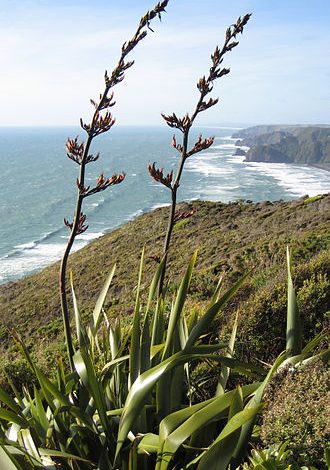Phormium

Phormium is a genus of two plant species in the family Asphodelaceae. One species is endemic to New Zealand and the other is native to New Zealand and Norfolk Island.[1] The two species are widely known in New Zealand as flax and elsewhere as New Zealand flax or flax lily, but they are not closely related to the Northern Hemisphere’s flax (Linum usitatissimum), which is native to the region extending from the eastern Mediterranean to India and has been used by humans since 30,000 B.C.[2][3]
Monocot classification has undergone significant revision in the past decade, and recent classification systems (including the Angiosperm Phylogeny Group) have found Phormium to be closely related to daylilies (Hemerocallis), placing it in family Asphodelaceae, subfamily Hemerocallidoideae. Phormium formerly belonged to the family Agavaceae and many classification systems still place it there. It includes two species, Phormium colensoi and Phormium tenax. It also includes many cultivars.
The genus was originally established by the German naturalists Johann Reinhold Forster and his son Georg Forster in 1775 from specimens of Phormium tenax collected by both Forsters and the Swedish naturalist Anders Erikson Sparrman. All of them were part of the second expedition of Captain James Cook aboard the Resolution (1772–1775).[4] The type specimens were taken from Queen Charlotte Sound, with additional specimens from both Norfolk Island and North Island, New Zealand.[5] The name Phormium comes from Ancient Greek for a “basket”, while tenax is a Latin adjective meaning “holding fast, tenacious”.[6]
Phormium is an herbaceous perennial monocot. The tough, sword-shaped leaves grow up to 3 metres (10 ft) long and up to 125 millimetres (5 in) wide. They are usually darkish green but sometimes have coloured edges and central ribs. Cultivated varieties range from light green through pink to deep russet bronze. There are numerous variegated cultivars with leaves marked by contrasting stripes in shades of green, red, bronze, pink and yellow.
